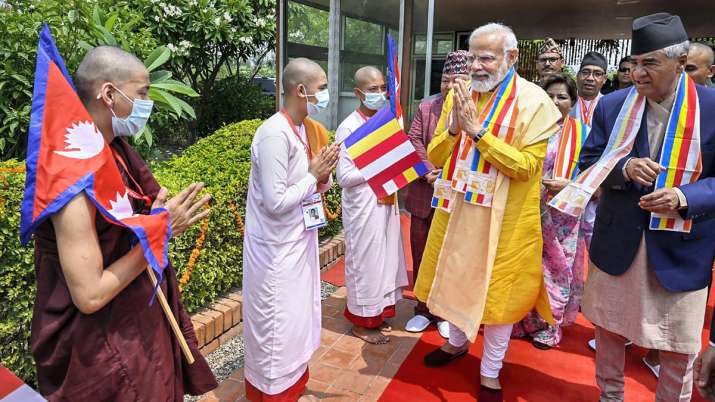
'India-Nepal ties unshakeable like the Himalayas', says PM Modi in his address at Lumbini

Prime Minister Narendra Modi said on Monday that India and Nepal’s ever-strengthening friendship and their closeness will benefit the entire humanity in the emerging global situation.
While addressing the International Buddhist Conference in Lumbini on Monday (May 16), PM Modi, who is on a one-day visit to Nepal, said that India and Nepal’s ever-strengthening friendship and closeness will benefit the entire humanity in the kind of global conditions that are emerging. He also said that India-Nepal relationship is “unshakeable” like the Himalayas.
PM Modi, who attended the 2566th Buddha Jayanti Celebration at International Convention Center and Meditation Hall at Lumbini, was accompanied by his Nepalese counterpart Deuba and his spouse Dr Arzu Rana Deuba. Several Nepalese ministers were among the other dignitaries present.
Six Memorandum of Understanding (MoUs) were signed. One was on the agreement for the development of the 490 MW Arun-4 hydro electric project in Nepal. This was signed in Lumbini, Nepal, in the presence of Prime Minister Narendra Modi and Prime Minister of Nepal Sher Bahadur Deuba, the company said in a statement on Monday.
SJVN Chairman and Managing Director Nand Lal Sharma said it will be the third mega project to be constructed by the company in Nepal. The construction of 900 MW Arun-3 project is in progress and the 669 MW Lower Arun project is at the survey and investigation stage.
With the MoU, signed by Sharma and Nepal Electricity Authority (NEA) Managing Director Kulman Ghising, SJVN has three projects with a total capacity of 2,059 MW in Nepal. According to Sharma, SJVN is targeting to have 5,000 MW projects in Nepal by 2030.
Also read: Key takeaways from Nepali prime minister’s visit to India
Opportunity to strengthen ongoing cooperation
Earlier, sharing images of PM Modi and Deuba holding bilateral talks in Lumbini, Ministry of External Affairs spokesman Arindam Bagchi called it an “opportunity to strengthen ongoing cooperation and develop new areas in our multifaceted partnership.”
PM Narendra Modi, in his speech Buddha Jayanti event in Lumbini, said the energy of the place where Lord Buddha was born gave him a different feeling.
The Prime Minister also referred to a Mahabodhi sapling that he had gifted in Nepal in 2014. The energy of the place where Lord Buddha was born, gives a different feeling. I was happy to see that the Mahabodhi sapling I had gifted in 2014 for this place, is now growing into a tree.
“Buddha is the embodiment of the collective understanding of humanity,” Modi told the gathering that included monks, Buddhist scholars and international participants.
Lumbini, located in the Terai plains of southern Nepal, is one of the holiest places of Buddhism, as Lord Buddha was born there
Continuing his speech at the event in Lumbini, PM Modi said: “The growing and strengthening friendship between India and Nepal will work for the benefit of entire humanity amid the kind of global situation that is emerging today. The devotion to Lord Buddha binds us together, and makes us members of one family.”
On Monday morning, Prime Minister Narendra Modi landed in Lumbini, the birthplace of Gautam Buddha, in Nepal to hold talks with his Nepalese counterpart Sher Bhadur Deuba. Modi is paying a day-long visit to the country on the invitation of Deuba.
PM Modi’s visit, the fifth since 2014, coincides with the occasion of Buddha Purnima. In this visit, PM Modi said in a statement that India expects to expand bilateral cooperation with Nepal in different areas, including hydropower, connectivity and development.
After paying a visit to the Maya Devi temple at Lumbini, PM Modi held talks with Nepal PM Deuba.
PM @narendramodi holds bilateral talks with PM @SherBDeuba in Lumbini.
Opportunity to strengthen ongoing cooperation and develop new areas in our multifaceted partnership.p pic.twitter.com/mhMd3ybtYc
— Arindam Bagchi (@MEAIndia) May 16, 2022
Earlier, Modi tweeted that he had landed in Nepal and was happy to be among the wonderful people of Nepal on the special occasion of Buddha Purnima.
“Landed in Nepal. Happy to be among the wonderful people of Nepal on the special occasion of Buddha Purnima. Looking forward to the programmes in Lumbini,” Prime Minister Modi said on Twitter upon his arrival.
I would like to thank PM @SherBDeuba for the warm welcome in Lumbini. pic.twitter.com/9rkmi2297o
— Narendra Modi (@narendramodi) May 16, 2022
PM Modi and his entourage, which comprises foreign affairs minister, S Jaishankar, foreign secretary Kwatra, National Security Advisor Ajit Doval, and other senior officials, arrived in a special Indian Air Force helicopter from Kushinagar, Uttar Pradesh.
On reaching Nepal, PM Modi offered prayers at the sacred Maya Devi temple on the occasion of Buddha Purnima. He was accompanied by his Nepalese counterpart Sher Bahadur Deuba during his visit to the historic temple, the birthplace of Gautam Buddha.
The Nepalese Foreign Ministry on May 11 said that Deuba will host a lunch in honour of Modi and the visiting delegation.
Modi’s visit is expected to contribute to further strengthening the bilateral relations and the age-old socio-cultural bonds between the two countries.
In his statement before he left for Nepal, Modi said he was looking forward to meeting Nepalese Prime Minister Sher Bahadur Deuba again after their “productive” discussions during his visit to India last month. “The ties between India and Nepal are unparalleled. The civilisational and people-to-people contacts between India and Nepal form the enduring edifice of our close relationship,” Modi said in his departure statement.
“My visit is intended to celebrate and further deepen these time-honoured linkages that have been fostered through centuries and recorded in our long history of intermingling,” he added.
Landlocked Nepal relies heavily on India for the transportation of goods and services. Nepal’s access to the sea is through India, and it imports a predominant proportion of its requirements from and through India.
The India-Nepal Treaty of Peace and Friendship of 1950 forms the bedrock of the special relations between the two countries.

